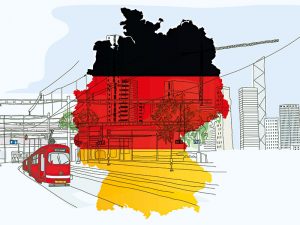
Germany, Europe’s largest economy, is currently navigating a period of significant economic turbulence. Recent data indicates that the nation’s economic output contracted by 0.2% in the fourth quarter of 2024, surpassing the anticipated 0.1% decline. This downturn has reignited concerns about a potential recession, especially as the country approaches snap elections scheduled for February 23, following the government’s collapse in November.
Persistent Economic Challenges
he contraction in late 2024 marks the second consecutive year of economic decline for Germany, with a 0.3% decrease in 2023 followed by a 0.2% reduction in 2024.his trend underscores the ongoing struggles within the German economy, which has faced stagnation since 2019.everal factors contribute to this prolonged downturn:
- High Energy Costs: he loss of affordable natural gas supplies from Russia has led to elevated energy prices, placing a significant burden on both consumers and industries.citeturn0search0
- Intensified Global Competition: German exports, particularly in the automotive and industrial machinery sectors, are facing stiff competition from countries like China. Despite an overall increase in world trade in 2024, German exports have declined, highlighting challenges in maintaining their competitive edge.citeturn0search0
- Elevated Interest Rates: he European Central Bank’s higher interest rates have deterred investments in new machinery and vehicles, further slowing economic momentum.citeturn0search0
- Political Instability: he collapse of Chancellor Olaf Scholz’s coalition government in November has led to political uncertainty, with early elections on the horizon. This instability complicates the implementation of cohesive economic policies aimed at revitalization.
Structural Economic Growth
Beyond these immediate challenges, deeper structural issues are affecting Germany’s economic model:
- Export-Dependent Model Under Strain: Germany’s traditional reliance on exports is being tested as key markets contract and competition intensifies. The automotive industry, a cornerstone of the German economy, is experiencing significant profit declines, leading to job cuts and reduced local tax revenues. Companies like Audi have reported severe profit downturns, underscoring the challenges faced by the sector.
- Energy Policy Missteps: Vast errors in energy policy have left Germany vulnerable to energy supply disruptions and high costs. The transition to renewable energy sources has been fraught with challenges, impacting industrial competitiveness.
- Fiscal Constraints: Germany’s stringent fiscal policies, particularly the “debt brake” rule limiting structural deficits to 0.35% of GDP, have constrained public investment. This has led to underinvestment in infrastructure and innovation, further hindering economic growth.
Potential Pathways to Recovery
Despite the bleak outlook, there are discussions on strategies to rejuvenate the German economy:
- Reevaluating Fiscal Policies: Adopting a more pragmatic approach to fiscal policy could provide an optimistic alternative. Loosening the debt brake limit might facilitate greater state-led investment, potentially spurring economic activity.citeturn0news15
- Monetary Policy Adjustments: Expected rate cuts in the Eurozone could ease borrowing costs and soften the euro, making German exports more competitive and stimulating economic growth.
- Energy Strategy Reforms: Efforts to resolve geopolitical tensions, such as the Ukraine conflict, might lead to shifts in security and energy strategies, further aiding the economy.
Conclusion
Germany stands at a critical juncture, facing both immediate economic challenges and deeper structural issues. The upcoming elections present an opportunity for policymakers to implement bold reforms aimed at revitalizing the economy. Balancing fiscal discipline with necessary investments in infrastructure, innovation, and energy transition will be crucial. The path forward requires a comprehensive strategy that addresses both the symptoms and root causes of the current economic malaise.


